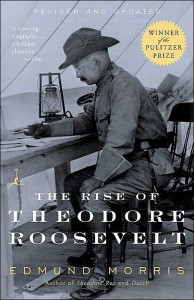Product Details:
Author: Edmund Morris
920 page paperback
Publisher: Modern Library
Released: 2001
While it would be difficult to capture the spirit of any American President, a position held by some of our most complex citizens, it would seem almost impossible to relate the essence of one of the greatest, Theodore Roosevelt. America’s 26th President was a personality that knew few bounds and even less fear and unlike many of those before or after him, he could have retired at the age of 40 having never entered the White House with an already incredible list of accomplishments. The Rise of Theodore Roosevelt covers this time period, from his birth in 1858 to his first day in office as President in 1901 after William McKinley was shot.
The book opens with a rich anecdote of the annual New Year’s Day ritual in which citizens of the Capital would file through the White House to shake the President’s hand. Morris cleverly introduces the story’s hero through the eyes of people that waited hours in freezing January temperatures to grip the President’s hand for no more than a second and a half. Morris describes the incredible line of people stretching down Pennsylvania Avenue and the overwhelming impression each is left with when they look Roosevelt in the eyes and take his hand. Through this we are shown not only the collective affection for the President but also his own will and love for the people as by 2:00pm he has shaken over 8,000 hands without pause. We get a glimpse of the determination and integrity of a man that by many accounts should barely have lived past adolescence due to wave after wave of illness. This episode sets the tone for the ensuing 900 pages, a battle of will for someone that is constantly knocked down and by sheer determination continues to get back up.
Before reading the book most may have a basic recollection of Teddy Roosevelt’s extensive resume of accomplishments, ranging from professional historian and zoologist to New York City Police Commissioner and Medal of Honor nominee. It’s important then to recognize how skillful Morris is in thoroughly covering these accomplishments but not dwelling on them or letting them define both his book and its subject. It would be too easy to simply recount the first half of Roosevelt’s life through his various titles and positions, yet Morris instead provides the perhaps more important personal context for those accomplishments. He paints a picture of the man through not only the extensive correspondence and journals he kept, but also descriptions of the world he lived in.
As much as Morris describes the world in which Roosevelt lived, he also depicts the world he shaped through an incredible cult of personality. Morris utilizes quotes from several people that were in close proximity to Roosevelt both personally and professionally to describe the penetrating effect he had on those around him. More often than not the quote will begin with an unrelenting first impression of a brash, awkward man who was direct almost to a fault, before giving way to a forgiving remark about a certain uncanny ability to win over both heart and mind. In explaining how stoic, dry and emotionally stunted men like Henry Adams, Thomas Reed, and Henry Cabot Lodge tolerated the boisterous Roosevelt , Morris writes that they “…grew dependent upon [Roosevelt’s] warmth, as lizards crave the sun” (164).
Perhaps as significant to the casual reader as historical accuracy and citation, the book is remarkably well paced for such a large volume. Morris does well to keep the story moving even when there’s opportunity for much more elaborate description or inferences and seems to keep the reader’s sanity in mind at all times. He is no doubt writing for both the history enthusiast and uninitiated and plays to both throughout the book, writing like a novelist but introducing enough primary source material to keep scholars content. Descriptions are rich in detail and even the action reads like a thriller at times but there is also an extensive section of notes and bibliography at the back of the book.
It should be said though that Morris’ depiction is colored by a somewhat romantic reverence for Roosevelt. The Rise of Theodore Roosevelt is almost Homer-esque, a sprawling epic poem in which the hero is determined to overcome the countless obstacles through cunning and determination on his way home from battle. Both Odysseus and Teddy are imprisoned at the beginning of each story (One on Calypso’s Island, one by illness), and both authors are sympathetic to their characters by forgiving any personality flaws as a product of their hardship. While this doesn’t exactly take away from the integrity of the book as its only “a feeling”, it does make me wonder if there were any more less than glowing accounts of his personality or ability.
In total The Rise of Theodore Roosevelt is a very well written and extensively researched book on one our greatest President’s and should go down as an authoritative account of his life before taking office. It seems a biography of such an exciting life would practically write itself without too much narrative effort from the author, but not taking it lightly, Morris’s skill actually adds to the story. Needless to say I’m excited to read the next installment in the trilogy, Theodore Rex, because if it’s even a bit as interesting I’m sure it will be a great read.
This book and Theodore Rex are available from Snell Library. The Library also has a number of other books on Roosevelt, including his speeches and autobiography.
